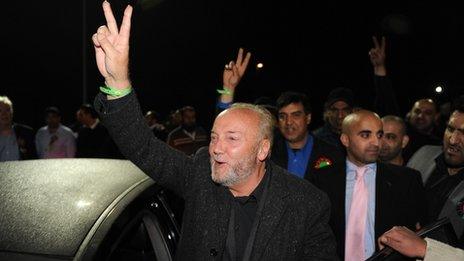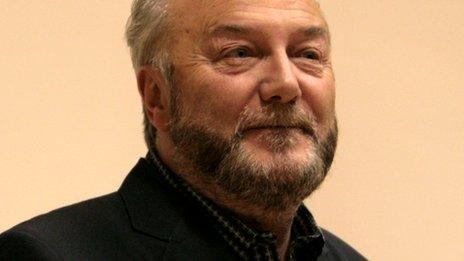Lonely at the top
- Published
David Cameron talks to the BBC's Nick Robinson
It is - they always say - a lonely job at the top and never more so than when your own side stop talking as if they are on your side.
With elections up and down the country next week I've spent the day with David Cameron. He told me en route to the West Country that it was important "to make sure you stay in touch". Contrast that with the words of a critic of his who, rather awkwardly, just happens to be a Conservative MP - Nadine Dorries.
"I think that not only are Cameron and Osborne two posh boys who don't know the price of milk, but they are two arrogant posh boys who show no remorse, no contrition, and no passion to want to understand the lives of others - and that is their real crime."
On a visit to the Airbus factory in Bristol I read out her opening words to the prime minister - this was his response:
"I don't agree with Nadine. She's got a very strong view about a number of things...
"You're always going to have MPs who don't agree with you, and you can either spend your entire time trying to appease them in some way, or you can actually say, look, you may not agree with everything I'm doing, but I'm doing the right job on behalf of the people of this country.
"People in this country, they are struggling to meet their bills, they are having a tough time. I understand that."
When I read out the rest he responded with a sigh and said, "I don't accept that", before saying: "The government is having to do difficult things."
What, though, of Ms Dorries' questions about the price of milk? The prime minister told me it was "just under 50p", before adding that he did "a lot of the family shopping" and often went to Sainsbury's in his Chipping Norton constituency "on a Friday or a Saturday".
David Cameron defended his government's decision to cut the top rate of tax and agreed that he was sorry for the handling of the possible fuel strikes - see below for transcripts.
He insisted that his vision - cutting the deficit and reforming welfare and education - remained unchanged by his recent problems.
"We're not just a bunch of accountants here to fix the deficit. We want a growing economy and a different country where we recognise that graft and effort should be rewarded," he said.
He knows, though, that he has to prove that he is in touch.
(You can see the full interview here, which includes questions on cuts, tax, Abu Qatada, House of Lords reform and the Murdochs)
TRANSCRIPTS:
David Cameron on tax
Nick Robinson: You say you want to help people who work hard and do the right thing, how do you think people feel if their tax credits are being cut, their child benefit, they're even paying more for a sausage roll or a pasty and they see the very rich getting a tax cut?
David Cameron: The first thing, in the Budget yes, of course, we took difficult decisions, but we did deliver a tax cut for 24 million working people. We raised the personal tax allowance so you can earn more before you start paying tax - we've actually taken 2 million of the lowest paid people in our country out of income tax altogether. I think that's right. Now as for the top rate of tax we inherited a 50p top rate of tax which was not raising significant money, making us uncompetitive with the rest of Europe. If we want to be competitive, if we want growth and jobs we've got to have competitive tax rates. So we reduced that 50p rate, but we paid for it five times over for the richest in our country.
Nick Robinson: My question though was this, how do those people you think of as hard working, doing the right thing, feel when their tax credits are being squeezed, when their child benefit is being cut and they even pay more for a hot sausage roll, when they see the rich get a tax cut - how do they feel?
David Cameron: I hope those people will feel, yes, we've got a government taking difficult decisions, but yes, they've got a government that is on their side. We have frozen people's council tax, we've cut their income tax, we've lifted the poorest out of income tax altogether.
Nick Robinson: They may wonder why on earth are you then giving the rich a tax cut when you've got so little money you're having to squeeze us?
David Cameron: But we're not giving the rich a tax cut, we took the top rate of tax down to make us competitive with the rest of the world, but taxes on the rich went up. We've paid for the cost of cutting that top rate of tax five times over for the richest people in this country.
Nick Robinson: There are some people - you'll know them, I know them - who'll think, 'I'm thousands of pounds better off a year than I was, [I] don't do these loopholes, but I do pay top rate of tax and it's just gone down.'
David Cameron: Well, people like that - the rich as a whole - will be paying more in tax, that's what's actually happening. We've delivered - I know we didn't communicate it perfectly, we've got a lot to learn from that - but we delivered a tax cut to 24 million working people, took 2 million people out of tax and the rich will pay more tax - but at a more competitive rate.
David Cameron on fuel
Nick Robinson: You say you didn't communicate it, you've had probably your worst month as PM. What in your view has gone wrong, what have you learnt?
David Cameron: Well, there isn't a day doing this job when you don't learn things. I think one of the key things to learn is that if you don't communicate what you're doing properly then, yes, you've got a problem and we need to deal with that and sometimes we've got the action right but the message hasn't been right.
Nick Robinson: Are the actions wrong?
David Cameron: Let me... I'm sure if I have they'll be extensively pointed out on this and other programmes.
Nick Robinson: Before you do... Are you saying, 'we've just made presentational errors'. Do you think, even if you don't want to spell them out, actually you've made some cock-ups frankly?
David Cameron: Look, I think sometimes a presentational mistake can be an important mistake, that's why the fuel strike issue I wanted to raise - because I think on the policy, on the action I think we've taken very effective action to make sure we're more protected as a country from a fuel strike. The plans I inherited, meant the military could perhaps provide 10% of the nation's fuel needs if the tanker drivers went on strike. We've totally changed that, ramped up what they can do, but did we communicate perfectly at every stage? I think most people would say, 'no you didn't'.
Nick Robinson: Do you think you owe people an apology on the fuel strike? They queued up, they worried that they wouldn't be able to go about their ordinary daily business and they think it was your fault?
David Cameron: I think people are actually very understanding about this issue, that responsibility for the fuel issue lies with the trade union that called a ballot that threatened a strike, that's where responsibility lies.
Nick Robinson interrupts: I think what they've said to me when I've interviewed people is we've being forced to queue for fuel and there isn't even a strike and that's the government's fault
David Cameron: The reason why people even thought about that was that there was a strike called by the union, but I think I've made clear that the government took the right action in terms of the resilience of the country - we need to do better in terms of communication.
Nick Robinson: And you're sorry?
David Cameron: Well of course, I'm responsible in the end for everything the government does and if we don't get it I'm very clear about that.
- Published30 March 2012

- Published30 March 2012

- Published30 March 2012